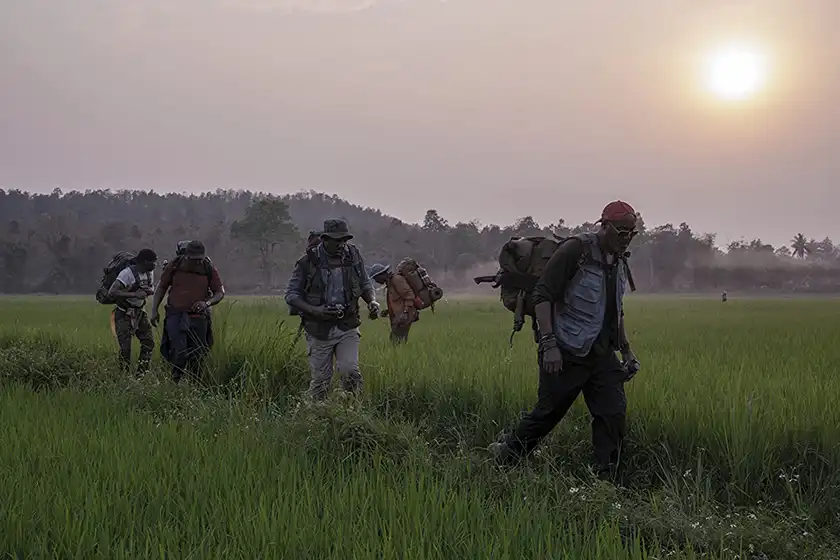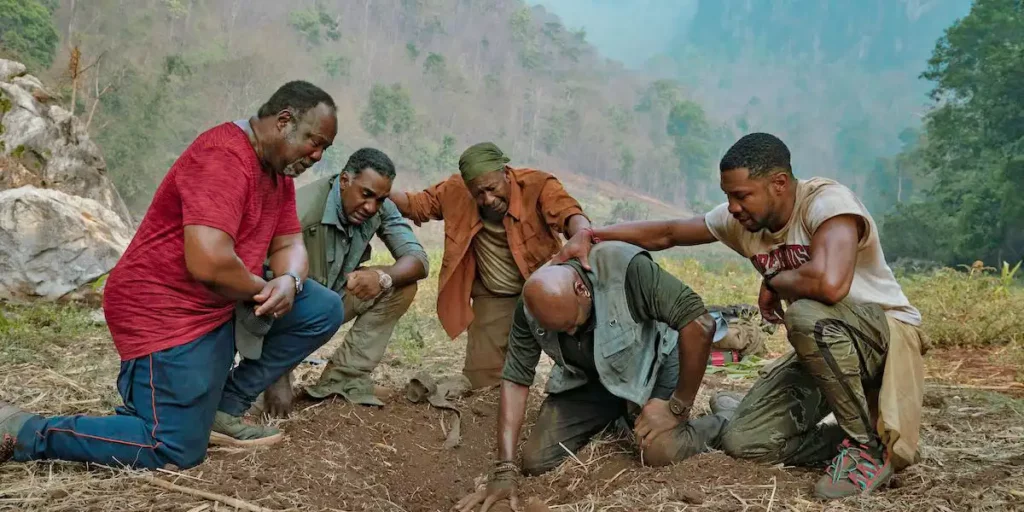The dynamite Da 5 Bloods doubles as both a blistering breakdown of America’s painful past and an exhilaratingly entertaining epic.
Acclaimed American auteur Spike Lee doesn’t make art that audiences can merely apathetically or absent-mindedly absorb. Every time one starts a “Spike Lee joint”, it’s as if the world-renowned writer-director draws you into a hypnosis, handily holding your attention from the first to final frame. From their striking and singular style to the way they always seem to have their finger firmly on the pulse of present-day politics, Lee’s films are fantastically fascinating features that both entertain and enrage, simultaneously. Therefore, it should come as no significant shock or surprise that Da 5 Bloods is just as unique and urgent as Lee’s best work, recontextualizing the narrative surrounding the vicious Vietnam War by accentuating the actions of African-American soldiers throughout this savage strife and exploring how the brutality they experienced on the battleground became a part of the battles they endured back home.
In a tale of two tremendously tense timelines, Da 5 Bloods covers both the titular quintet’s wartime work in the 60s and the four living members’ contemporary quest to return to the country where they once fought, in search of their former captain’s remains and a long-forgotten fortune. With so many essential events to be examined over Da 5 Bloods’ 156-minute runtime, it’s easy to see how a less-experienced filmmaker could potentially crumble under all of that pressure and fail to do this stirring story justice. However, because Lee has assembled such an admirable array of able-minded actors and cultivated such a courageously capable crew, Da 5 Bloods’ subject matter is expertly explored to the fullest extent, and it is this fervent faithfulness that allows the film to be as poignant as possible.
What separates Da 5 Bloods from other classic chronicles of the Vietnam War (such as Apocalypse Now, The Deer Hunter, and Platoon) is Lee’s decision to analyze this anarchy through the eyes of Black Americans. Alongside frequent collaborator Kevin Willmott, Lee took a story treatment originally written from a white perspective (by Danny Bilson and Paul De Meo) and revised and reshaped it to center around African Americans. In doing so, Lee illuminates issues that have often been inappropriately ignored throughout history. To start, even though these African American soldiers share the pains of PTSD with their white brothers-in-arms, their specific strife does not stop there. Alongside this emotional and mental mutilation, these African American soldiers must additionally scramble through strenuous social skirmishes upon returning home, as they confront a country that still doesn’t view them as equals to their white brethren; this additional anguish and antagonism only amplifies the plights that they are already poorly processing.

Even worse, many of these Black soldiers find it impossible to make peace with their part in what many deem to be a “corrupt” conflict, and who can blame them? How can one possibly feel content in chivalrously campaigning for a country that has never shown them that same commitment or consideration? Stock footage of Muhammad Ali placed at the start of the film tackles this very theme, as the prized professional boxer stoically states, “My conscience won’t let me go shoot my brother or some darker people or some poor, hungry people in the mud for big, powerful America. And shoot them for what? They never called me “n—-r.” They never lynched me. They didn’t put no dogs on me. They didn’t rob me of my nationality.”
The immorality of the Vietnam War has been incessantly investigated over the past 45 years, but, as Ali indicates, none felt that crisis of conscience more than the African American soldiers who were forced to spread the same suffering that they were scarcely surviving through on their own soil in a whole new setting. Though we as a society are aware of the scars that soldiers bring home after their time in battle, Black Americans in combat have historically bore an even greater burden due to this saddening synthesis of emotional, social, and moral stressors, and Lee skillfully spotlights these struggles in Da 5 Bloods’ scathing screenplay.
As Da 5 Bloods’ lively leads, Clarke Peters (The Wire, Harriet), Norm Lewis (Broadway’s The Phantom of the Opera), Isiah Whitlock Jr. (BlacKkKlansman, 25th Hour), and Delroy Lindo (Crooklyn, Clockers) all bring a lived-in legitimacy to their parts, which powerfully adds to the purity of their portrayals. Though it would be impossible to gain an intensive, in-depth insight into each of these incredibly idiosyncratic individuals and their specific post-war woes, all four actors have clearly committed to their character work wholeheartedly, and these earnest efforts make even the most minute action feel astonishingly affecting. Every look, every laugh, and every line reading carries a world-weary weight, but for each of these mistreated men, that slight strain stands for something different. Peters’ Otis left behind his love in Vietnam and deals with his despair by taking drugs, Lewis’ Eddie is fervidly fending off financial ruin, and Whitlock Jr.’s Melvin puts off his problems in favor of ill-advised philandering pursuits. Yet, it is Lindo’s Paul who proves to be the most provocative – and most thought-provoking – personality.
In mere moments, it becomes clear that Paul is a career-defining character for Lindo, who has been a cherished companion of Lee’s ever since his supporting turn in 1992’s Malcolm X. As a tormented, Trump-supporting (yes, you read that correctly) Vietnam vet with skittish sensibilities and deep-rooted damage caused by witnessing the death of the group’s much-loved leader, “Stormin’ Norman” (a captivating Chadwick Boseman), Lindo’s Paul is a ferocious firecracker, and audiences are constantly on edge waiting for his next manic move. While he isn’t without heartfelt moments of humanity that display the beauty of Black brotherhood – either directed towards his cherished comrades or his estranged son (Jonathan Majors of The Last Black Man in San Francisco) – Paul is most often found fighting off his demons in his own fractured reality, and his unpredictability creates a sense of unease that threatens to upend the group’s unity.
Lindo determinedly delves directly into the three-dimensionality of this wounded warrior, and he heroically highlights all of Paul’s hurt while never losing sight of his soul. Paul is a deeply disturbed individual, but he is not a stereotype by any stretch of the imagination, and Lindo affords him the authenticity to be able to offer his own account of his life with all its complexities and contradictions. It’s a powerhouse performance that sears itself into every viewer’s psyche, and, it should absolutely be at the center of any awards-season related conversation for months to come.
In the director’s chair, Lee is just as wondrously wild as he is with his writing, filming the 60s-set fight scenes with a fiery fury that could only belong to this audacious artist. His effervescent endurance is felt throughout every frame, and even as the film meanders a tad in its middle stretch, Lee brings that buzz back with a terrifyingly tense third act that starts with one of the most suspenseful sequences in the director’s entire filmography. Lee receives accomplished assists from cinematographer Newton Thomas Sigel (Drive, Bohemian Rhapsody), who captures both the bountiful beauty and the bleak barbarism of the Vietnam environment in equal measure, and editor Adam Gough (Roma), who keeps the chaos moving at a clip by brilliantly balancing beats between the two time periods and easing us into these transitions with appealing aspect ratio alterations.
Though perhaps less concentrated and crowd-pleasing than Lee’s last film, BlacKkKlansman, Da 5 Bloods is nevertheless a harrowing and holistic history lesson with stupendous substance for all to savor. It’s almost impossible to sum up this monster of a movie in one statement, so instead, I will conclude by shining a light on a striking choice that Lee makes when shooting his protagonists in their past; as opposed to de-aging his actors (à la The Irishman), Lee lets Peters, Lewis, Whitlock Jr., and Lindo remain as they are and as we view them in the present. To some, this may feel jarring, but when Lee’s greater genius comes into focus, all of the pieces of his plan fall into place. These men appear physically unchanged in these flashbacks because, in their minds, they never truly left; the conflict has never ceased. Whether it be related to Vietnam or the Civil Rights movement, they are fixedly frozen in time, in continuing combat.
For some, the war can never truly be won.
Da 5 Bloods is available to watch on Netflix. Read our reviews of Do The Right Thing, Malcolm X and Mo’ Better Blues!

